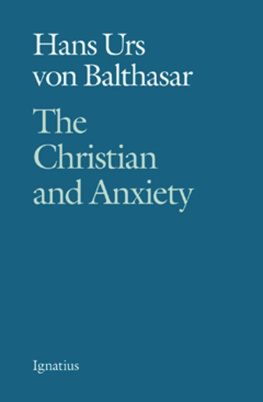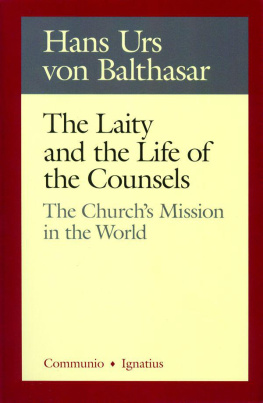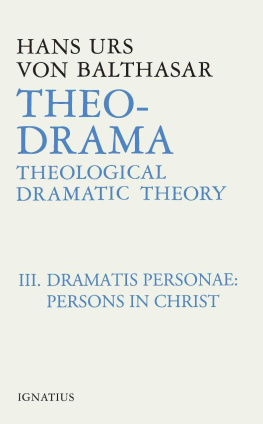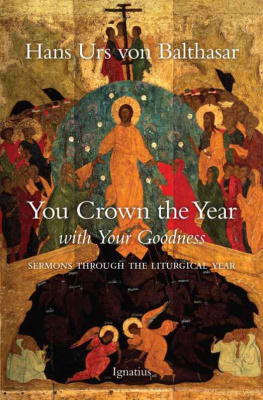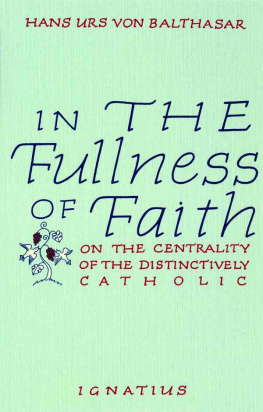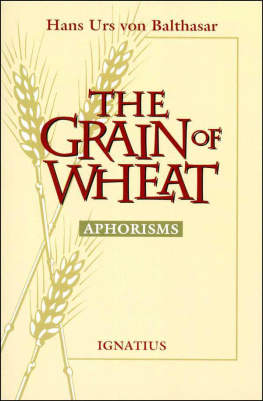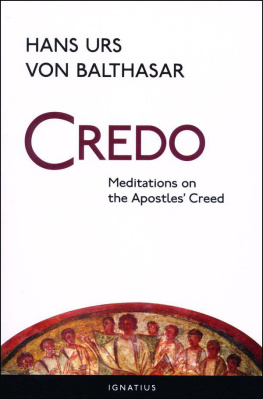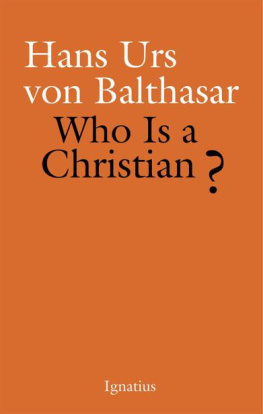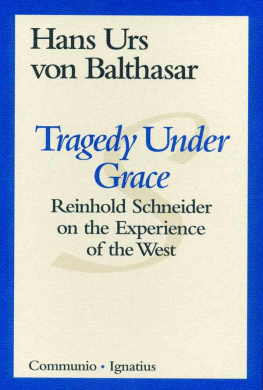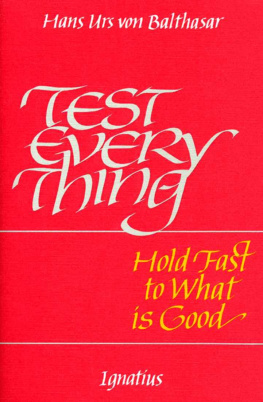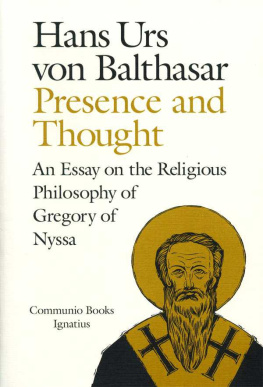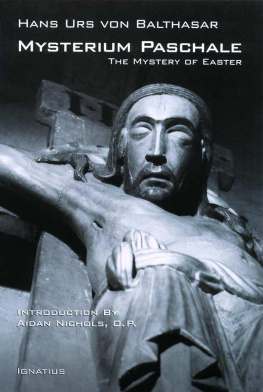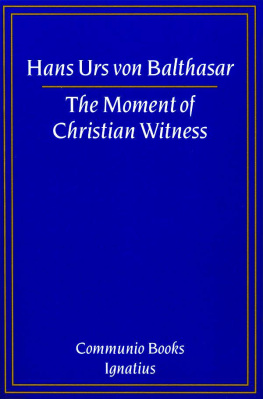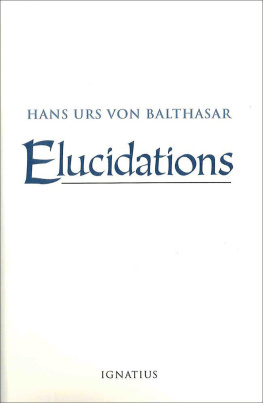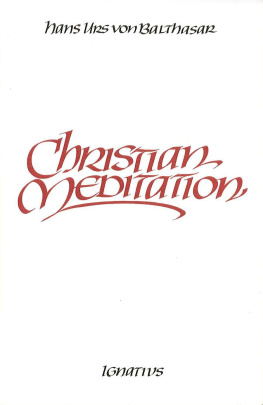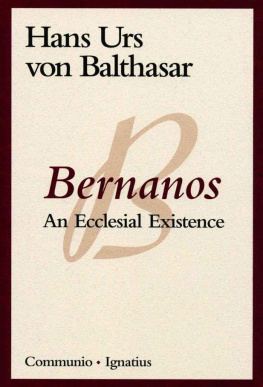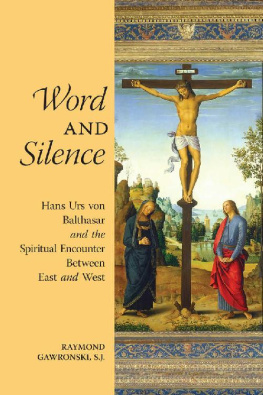THE CHRISTIAN AND ANXIETY
HANS URS VON BALTHASAR
The Christian
and Anxiety
Translated by Dennis D. Martin
and Michael J. Miller
With a Foreword by
Yves Tourenne, O.F.M.
translated from the second
French edition by Adrian Walker
IGNATIUS PRESS SAN FRANCISCO
Originally published as Der Christ und die Angst (1952)
Reissued in the series Christ heute, 2d series, volume 3
1989 Johannes Verlag, Einsiedeln, Trier
Foreword by Yves Tourenne, O.F.M.,
taken from the 2d French edition,
Le Chrtien et Vangoisse
1994 Descle de Brouwer, Paris
Translated and used by permission
Cover design by Roxanne Mei Lum
2000 Ignatius Press, San Francisco
All rights reserved
ISBN 0-89870-587-8
Library of Congress catalogue number 96-83637
Printed in the United States of America
CONTENTS
FOREWORD TO THE
SIXTH GERMAN EDITION
(1989)
In response to many requests from our readers, we venture to issue this small book again, shortly after the death of its author.
Following upon philosophical and psychological studies of the topic, this is the first strictly theological study of anxiety. Taking Sacred Scripture as its point of departure, it seeks to grasp the general Christian Jaws that determine the meaning and limits of anxiety, so as to establish finally its essence in a speculative way. That is how the book was introduced to its readers in 1953. Since that time, through a lively exchange with the steadily advancing insights and observations of psychology and psychiatry, anxiety has become a burning issue in theology as well. The author had intended to complete his earlier work by incorporating into it the fruits of this interdisciplinary dialogue. It was a great disappointment for many that he did not have the opportunity to do so. The theological foundation that is laid in this first study, though, may well continue to stimulate further work.
TRANSLATORS NOTE
Angst has entered into the English language on a popular level, usually conveying psychological overtones. Although neither anxiety nor anguish, insecurity nor fear by itself fully captures the range of connotations of the German word, anxiety and anguish have generally been employed for direct translation of Angst . Since the entire book seeks to explain the range of meanings of Angst , it seems unlikely that the richness and variety of anxiety will be lost on the reader.
Depending on the context, Geist in German can mean mind, ghost or spirit. In this book, which is a response to Kierkegaards analysis of anxiety and the repercussions that it had in German Catholic and Lutheran theology, the term is used in contradistinction to Seek , soul, and often denotes the human faculty of intellect in the Aristotelian sense. Therefore Geist has been translated as mind (cf. Geistesgeschichte , intellectual history).
Unless otherwise noted, Scripture quotations have been taken from the Revised Standard Version, Catholic edition.
Michael J. Miller
FOREWORD
A Theology of Anxiety?
The Christian and Anxiety is a demanding book. Its dense philosophical analyses, its frequent dramatic passages, and its commentaries on numerous biblical texts can easily deter the prospective reader. In order to glimpse the greatness of Hans Urs von Balthasars work through this thicket of difficulties, we need to get a good handle on the method he adopts in it.
Balthasar never separates method from content. The object itself entails a certain way of conceiving and approaching it, just as method is already a matter of content. That having been said, it is nonetheless good to distinguish the two levels.
An outline of the book helps to bring its method into relief. The work opens with a reflection on the Bible; at the beginning of chapter 2, Balthasar tells us that, throughout the remainder of the discussion, we must keep in mind what the Word of God alone ( CA , 81ff.) is able to teach us about anxiety [ angst ]. The first, scriptural part of the book is meant to portray both the contemporary situation and the then current accounts of anxiety, Freudian or philosophical. Although the introduction reflects the situation of the time in which the book was written, Balthasar insists ( CA , 35) on the need to take distance from it, lest the analysis of anxiety prove to be yet another expression of it.
The reader should approach the second chapter of the work, which could be called its center (it has the same tide as the book), only in terms of the first. Yet even when he does so, he will encounter certain surprisingly abrupt statements. These statements can be accounted for by the fact that it is the Word of God that puts human anxiety (of which the Christian is at once the victimlike every manand the conqueror) in its proper perspective. Balthasars method, which makes the Word of God both the starting point and the permanent basis of reflection, may be reminiscent of Karl Barms verticalism. In truth, Balthasar shows that the necessary distance mentioned above, by a kind of incidental side effect ( CA , 36), results in a capacity to go to the very heart of contemporary anxiety.
For this reason, The Christian and Anxiety ends with a third part, which initially can be described as philosophical. The Catholic thinker cannot remain content with a kind of sola scriptura or even with a purely theological account of anxiety. If theology is going to reach contemporary man, it has to integrate philosophical reflection.
Balthasar thus proceeds to link philosophy and theology. On the other hand, philosophy, at least in the modern period (Hegel, Kierkegaard, Heidegger, Sartre), has seen anxiety as a fundamental dimension of mans existence ( CA , 119). Hence Balthasars search for a point of contact, an intrinsic link, between reflection on revelation and reflection on human existence. The object of philosophy is always more than philosophical ( CA , 115); it stands out against an original horizon, as Merleau-Ponty and Lvinas, following Husserl, have shown. From the Catholic point of view, the concrete world on which philosophy reflects is never a pure natura but is always the world that is sustained and penetrated by grace. Theology, for its part, precisely because it reflects on Gods self-revelation in mans history and speech (Israel, Jesus, the Church), necessarily entails ontological reflection: revelation meets and illuminates mans situation in the world at an undreamed-of depth.
In this way, Balthasar the theologian, speaking as he does to the men of Iris time, quite naturally picks up themes and accents of contemporary thought: Kierkegaard, Heidegger, existentialism.... We could therefore say, using Balthasars own terminology, that there is both a distance and a mutual reflection [ ricochet ] between attentive listening to revelation (chapter 1) and ontological reflection (chapter 3).
Finally, Balthasar goes on to forge an original account of the link between the Old and New Testaments. Although both together make up the one revelation, a profound transformation occurs in the passage from the former to the latter. The New Testament marks a break; it radically intensifies the revelation of anxiety. At Gethsemani and on the Cross, all possible anxiety, both of the just and of the guilty, is concentrated upon the Redeemerand this very concentration is the absolute revelation of grace, the eschatological gift of peace, the victory, at once promised and already granted, over all anxiety ( CA , 81ff.).
Mans Anxiety, Gods Anxiety
The purpose of Balthasars method is to legitimate the works central project of giving a Christian interpretation of anxiety, or rather, of clearing a path to the root meaning of anxiety by refusing to take what is just one of its manifestationsthe morbidity of our timeas its ultimate meaning ( CA , 36).
Next page
